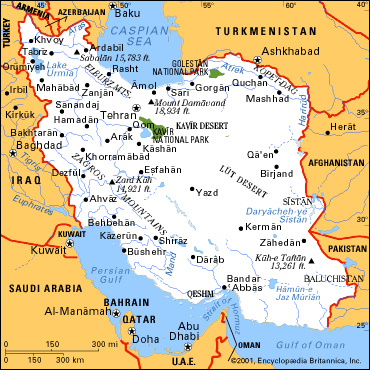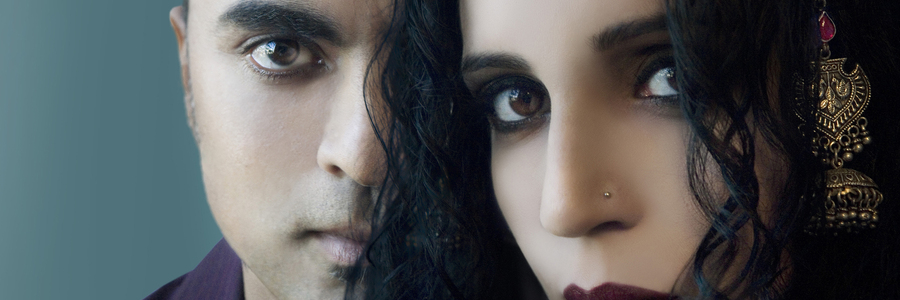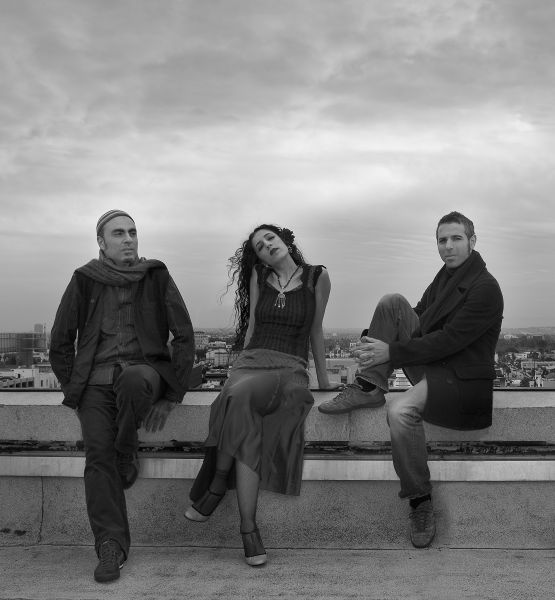Iran
Loga Ramin Tarkian (left) and Azim Ali of Niyaz. The trio is rounded out by its producer, Carmon Rizzo (not pictured):Niyaz: A 21st Century Global Trance Tradition
By any measure, Niyaz has come very far, very fast. The trio's 2005 debut featured a convincing blend of Sufi mysticism and trance electronica, and quickly established them as a standout ensemble in a very crowded world music field. A worldwide tour followed. In 2008, Niyaz returned with Nine Heavens, which doesn't just cross cultural and stylistic boundaries, but the centuries as well. Drawing on medieval Persian poetry and 300-year old Persian folk songs, Niyaz has created a 21st century global trance tradition.
This may seem like a tall order for a young band—until you realize who these musicians are. Vocalist Azam Ali co-founded the best-selling world music duo Vas in 1996; her unmistakable voice has graced numerous recordings and major film scores. Loga Ramin Torkian is a multi-instrumentalist whose group Axiom of Choice brought the ancient sounds of Persian classical music to Western listeners in the 1990s. And producer Carmen Rizzo, a multiple Grammy nominee, has worked with Coldplay, Seal, Ryuichi Sakamoto, and many others. Small wonder then that the trio hit the ground running with its self-titled debut. Now, with Nine Heavens, Niyaz breaks new ground in a two-disc format: the first is an adventurous, spiritual exploration of the ties that bind Persian, Indian, Turkish, and Western dance music. The second disc showcases eight out of the nine songs in a purely acoustic setting.
Niyaz live at Le Poisson Rouge, Feb. 26, 2010, New York City, Feb. 2010, ‘Beni Beni,’ which marries an 18th century Turkish Sufi poem to a traditional Turkish folk song and some beautifully integrated electronics and programming. From the album Nine HeavensNine Heavens begins with the irresistible "Beni Beni," which marries an 18th century Turkish Sufi poem to a traditional Turkish folk song and some beautifully integrated electronics and programming. "It's a modern kind of Sufi music," Azam explains. "Both Loga and I are influenced by Turkish music, and there are many connections between Turkey and Iran." The steady, trance rhythms support layers of Turkish and Persian lutes, all topped by a new instrument known as the kamman, a larger, lower-pitched version of the traditional Persian fiddle.
Niyaz draws even more connections between Iran and India. The word niyaz means "yearning" in both Farsi, the language of Iran, and Urdu, a major language of northern India and Pakistan. Over the centuries, the cultures of Persia and India have shared not only words, but musical and spiritual traditions—and people. Azam Ali is one of them, born in Iran and raised in India; and two of the songs on Nine Heavens are by Amir Khosrau Dehlavi, a 13th-century Persian mystic and poet who was also raised in India. (The album title comes from his "Song of Nine Heavens.") Amir Khosrau founded the style of Sufi music known as Qawwali, made famous in the recent past by the great Pakistani singer Nusrat Fateh Ali Khan, and some claim he invented the Indian tabla drums as well. But his poems, including "Molk-e-Divan" and "Sadrang," are in the great tradition of Persian mystics like Rumi. "'Molk-e-Divan' was the first song we wrote for the new album," Azam says. "Loga and I found the poem and wrote the music together; he did the main melody and I did the vocal line." Then, the whole thing was shipped off for Carmen to work his magic, which in this case consists of some highly processed drum programming and a rich tapestry of Near Eastern lutes and electronics.
(from left) Loga Ramin Tarkian, Azim Ali and Carmen Rizzo: 'The function of music in society has changed,' Loga points out. 'It's very different from one or two decades ago; people now listen on iPods, or in their cars; music is not their primary focus. There's not as much sitting and listening to music. So the goal is for the music to stand on its own in different contexts.'Both Amir Khosrau texts can be read either as love poetry or as devotional songs to God. Of course, an English-speaking audience may be more likely to respond to the songs' earthy, throbbing rhythms. That's fine with Niyaz; Azam Ali points out that the sacred nature of the texts makes them a surprisingly good fit for Western dance music. "The common thread is putting yourself in a higher state. Even with club music, I think that's what people go to it for. The only problem was that it was void of ‘soul,’ the spirit of acoustic trance music. We always felt there was a way to bring the two together that blurs the line between the acoustic and the electronic." A good example is the song "Tamana," an 18th century Urdu poem that unfolds over a slow opening—much like the slow alap section of a raga performance. The electronic drones give way to the silvery tone of the Turkish cumbus, a type of lute, and as with a raga performance, the energy builds with the addition of percussion—in this case, both tabla and programmed beats. "We've been working so long now that this sort of fusion happens on a more intuitive level," Loga adds. "The steady rhythm of the tabla blends naturally with the dance grooves—it just makes sense."
So what about that "unplugged" disc? "It wasn't intentional," Azam recalls. "As it was coming together, we felt we had a real gem with the acoustic sessions. After we finished mixing both versions, we realized it would be a shame not to let people hear them." The result is a rare opportunity to get inside the music, as the acoustic versions reflect the songwriting talents and mystical leanings that Azam and Loga bring; then the "final" versions showcase the organic way Carmen's electronics fit both the rhythms and the mood of these deeply-rooted works.
Other highlights of Nine Heavens include "Iman," a lullaby written by Loga and Azam for their infant son. Essentially a musical prayer, it offers a pause in the album's rush of rhythmic excitement. And "Feraghi—Song of Exile" is close to the hearts of the two Persian igr, now living in California. At a time when most Americans have a distorted view of Iran and Iranian culture, Niyaz have been doing workshops to raise awareness of the contributions of Iranians in the U.S. and of Persian culture in general. "Our Iranian identity is important," Loga says. "On the first Niyaz album, we were just trying to find our place here. Now, with this second record, the Persian elements are used with more confidence." For example, "Feraghi” uses a Persian five-beat rhythm, which most Americans would find difficult to dance to—but the blend of traditional and programmed beats is so persuasive that many would try.
Dance or trance—the music that Niyaz makes on Nine Heavens can serve either purpose. "The function of music in society has changed," Loga points out. "It's very different from one or two decades ago; people now listen on iPods, or in their cars; music is not their primary focus. There's not as much sitting and listening to music. So the goal is for the music to stand on its own in different contexts."
‘In the Shadow of Life,’ Niyaz, from its eponymous debut album, live at Le Poisson Rouge, New York City, Feb. 26, 2010,
***
Critical Take: Tom Orr, World Music Central.org
‘It’s marvelous stuff, seeming to yearn for something just out of reach and yet grabbing hold of a spiritual clarity that’s alternately revving and calming. And the musical/cultural duality at work here is manifested in the way the songs are presented as well…’
I managed to miss out on Niyaz ’s 2005 first album, and given how stirring their new Nine Heavens is, perhaps I should do some backtracking. But first a few more words about Nine Heavens: it’s rooted, as an increasing number of musical projects seem to be nowadays, in the mystical poetry of Sufism. With the great mystic poet Rumi getting his due all over the place, Niyaz (comprised of Persian-American vocalist Azam Ali, multi-instrumentalist Loga Ramin Torkian and producer/programmer/keyboard player Carmen Rizzo) instead turn their attention toward 13th century mystic Amir Khosrau Dehlavi, said to have invented the qawwali devotional music popularized by Nusrat Fateh Ali Khan, and the ghazal styled 18th century poems of Khwaja Mir Dard and Hali.
The source material is reflective of Niyaz ’s blending of Persian and Indian (and on this disc, a shade of Turkish) musical sensibilities, a connection apparent in cross-cultural similarities that are centuries old and here musically beautified with the same sort of passion that inspired those ancient mystics.
The most immediately striking thing about the album is Ali’s voice: her angelic, ghostly tones (which have served her well on previous solo projects and her work as half of the duo Vas) are at their strongest here and it doesn’t take long to realize how much of that strength is brought to the fore through a rich weave of string, percussion and wind instruments emboldened with cavernous modern production. It’s marvelous stuff, seeming to yearn for something just out of reach and yet grabbing hold of a spiritual clarity that’s alternately revving and calming. And the musical/cultural duality at work here is manifested in the way the songs are presented as well: there’s a second disc featuring nearly every track (minus, unfortunately, the trembling lullaby “Iman”) performed acoustically. But that doesn’t mean they’re subdued or lessened. Indeed, the acoustic versions are every bit as thunderous a combination of possessed dance rhythms and inward meditation as their plugged-in counterparts, and the seamlessness of the Persian/Indian fusion is even more striking. Highly recommended.
Founder/Publisher/Editor: David McGee
Contributing Editors: Billy Altman, Laura Fissinger, Christopher Hill, Derk Richardson
Logo Design: John Mendelsohn (www.johnmendelsohn.com)
Website Design: Kieran McGee (www.kieranmcgee.com)
Staff Photographers: Audrey Harrod (Louisville, KY; www.flickr.com/audreyharrod), Alicia Zappier (New York)
E-mail: thebluegrassspecial@gmail.com
Mailing Address: David McGee, 201 W. 85 St.—5B, New York, NY 10024






